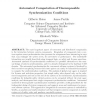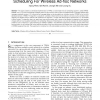316 search results - page 8 / 64 » On the Space Complexity of Randomized Synchronization |
HASE
1997
IEEE
13 years 11 months ago
1997
IEEE
: The most important aspect of concurrent and distributed computation is the interaction between system components. Integration of components into a system requires some synchroniz...
TMC
2008
13 years 7 months ago
2008
We consider a scenario in which a wireless sensor network is formed by randomly deploying n sensors to measure some spatial function over a field, with the objective of computing a...
IISWC
2008
IEEE
14 years 1 months ago
2008
IEEE
The design and evaluation of microprocessor architectures is a difficult and time-consuming task. Although small, handcoded microbenchmarks can be used to accelerate performance e...
SAMOS
2007
Springer
14 years 1 months ago
2007
Springer
As multi-processor system-on-chip (MPSoC) has become an effective solution to ever-increasing design complexity of modern embedded systems, fast and accurate HW/SW cosimulation of...
MOBIHOC
2006
ACM
14 years 7 months ago
2006
ACM
This paper presents a distributed implementation of RAND, a randomized time slot scheduling algorithm, called DRAND. DRAND runs in O() time and message complexity where is the max...


